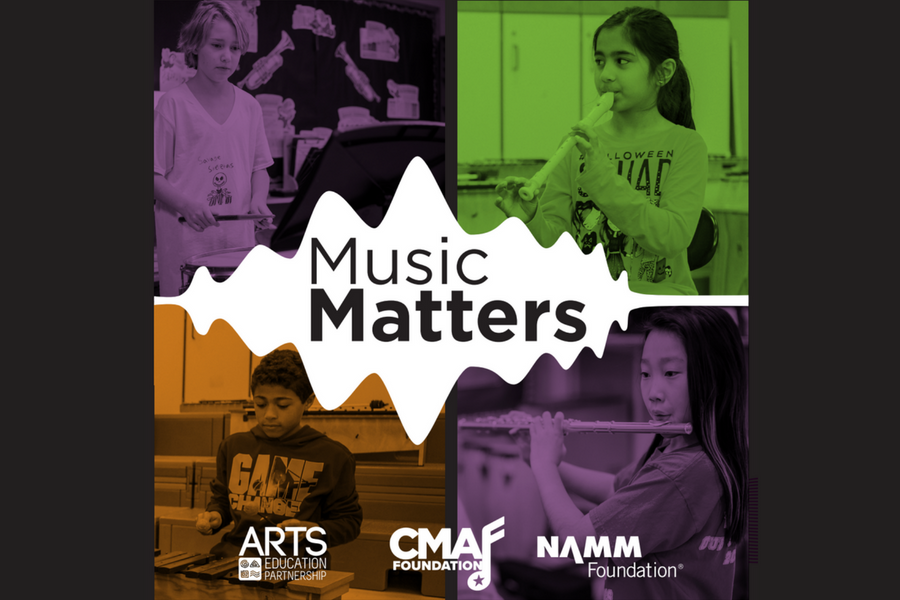
Why Music Matters
Mounting Evidence Shows Music Education Boosts Student Achievement in Reading and Math; Helps Students Stay in School

Passage of ESSA Should Have Meant More Music and Arts; Advocates on Capitol Hill This Week Say a Wide Opportunity Gap Still Prevails
Condensed guide “Music Matters” released this week, highlights recent findings
Washington, D.C. – Last week, National Public Radio aired a lengthy feature, “The Surprising Benefit of Moving and Grooving with Your Kid,” highlighting the cognitive benefits for preschoolers and their parents who are exposed to rhythm and melodies. It’s not just preschool students seeing gains, a wide body of new research shows that music education plays an important role in social development and academic success throughout K-12 education.
“The facts are clear,” said Mary Luehrsen, executive director of the NAMM Foundation. “When students have a chance to play an instrument, sing in a chorus or participate in other musical activities, they are more likely to stay in school – more likely to perform better in English, math, science and second languages.”
Armed with this growing body of research, music advocates from across the U.S. including the Arts Education Partnership, The Country Music Association Foundation, and the NAMM Foundation, are meeting with members of Congress this week, calling for more music resources to be made available in U.S. classrooms. “We’re translating knowledge into action,” said Luehrsen. “Musicians, music educators and music merchants are telling members of Congress this week that all students deserve a chance to experience hands-on music education, regardless of income, race or geography.”
The Every Student Succeeds Act (ESSA), passed and signed into law in 2015, the successor to the No Child Left Behind Act (NCLB), identifies music as a core academic subject required for a complete education for all students. In many communities, however, music is still regarded as “extra-curricular,” treated as a luxury and subject to budget cuts when school districts face financial constraints.
Often these are the same schools and districts under intense pressure to focus on academic subjects where outcomes can be measured by standardized tests at the expense of other areas of a well-rounded education. The latest research, however, shows that ignoring music education can be counterproductive – because these programs improve overall academic performance across a wide range of subjects, and help students stay in school.
For example:
- Music students do better in English, math and science than their peers without music. Researchers at the University of British Columbia found that high school band students have higher achievement scores in English, math and biology than students who are not in band classes.
- More music and art mean fewer dropouts, and a reduced number of suspensions. Scholars from the University of Kansas, evaluating the Music Makes Us program in Nashville, found graduation rates 20 percent higher for students with at least one year of music, and 30 percent higher for those with more than one year of music. In addition, a longitudinal study from the University of Maryland found that for each additional year of arts education, students were 20 percent less likely to be suspended from school.
- Music students are better at learning a second language. A study by neuroscientists at the University of Toronto found that students who received “early extensive and continued music education showed greater fluency and competence in learning a second language, when compared to non-music students.
A condensed guide that highlights these research findings and other research that demonstrates the connection between student success and music education entitled “Music Matters” can be found at: https://www.ecs.org/music-matters/.
About The NAMM Foundation:
The NAMM Foundation is a non-profit supported in part by the National Association of Music Merchants and its approximately 10,300 members around the world. The foundation advances active participation in music making across the lifespan by supporting scientific research, philanthropic giving and public service programs. For more information about the NAMM Foundation, please visit www.nammfoundation.org.
# # #
Media Contacts
NAMM Communications - John Dolak, Director
johnd@namm.org
619.735.4028
The Lippin Group for NAMM
namm@lippingroup.com
201.317.6618
About NAMM
The National Association of Music Merchants (NAMM) is the not-for-profit association with a mission to strengthen the $19.5 billion music products industry. NAMM is comprised of 15,400 global member companies and individual professionals with a global workforce of over 475,000 employees. NAMM events and members fund The NAMM Foundation's efforts to promote the pleasures and benefits of music and advance active participation in music-making across the lifespan. For more information about NAMM, please visit www.namm.org.